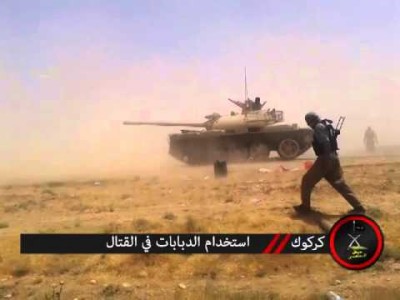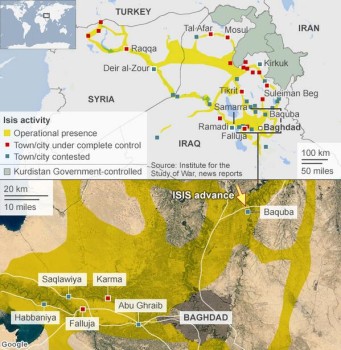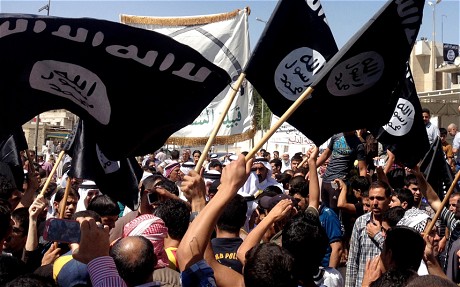LATEST: Bodies of 18 Security Forces Discovered
Insurgents, led by the Islamic State of Iraq and as-Sham, claimed another town in Iraq on Monday and moved within 40 miles of Baghdad, as the US pondered its options against the offensive which has taken much of the north of the country.
The insurgents moved into Tal Afar in northwestern Iraq after intense clashes. A city official said, “The city was overrun by militants. Severe fighting took place, and many people were killed. Shi’ite families have fled to the west and Sunni families have fled to the east.”
Deputy provincial council chief Nuriddin Qabalan said that there were pockets of resistance to the insurgents and that soldiers, policemen, and residents held on to parts of the airport.
Fifty civilians were killed in the violence, along with dozens of militants and members of the security forces, Qabalan said.
Mohammed al-Bayati, a Tal Afar native who heads the security committee on Nineveh provincial council, said between 500 and 700 militants were involved in the assault.
The advance into Tal Afar, 40 miles west of Mosul, boosts the insurgent movement of personnel and resources across the Iraqi-Syrian border. ISIS has been involved in Syria since 2013 and has been fighting Syrian insurgents since January in the north and east of the country.
ISIS and opposition fighters established a tentative cease-fire with Kurdish peshmerga, who have moved into Kirkuk and other areas abandoned by Iraqi forces, in the north. At points, the two sides are only 0.5 km (0.3 mile) apart.
A tank of the Sunni faction Jaish al-Mujahidin fires on Iraqi forces in Kirkuk Province:
Passed today here in Northern Iraq convoy of Kurdish forces getting ready to move towards Kirkuk to fight ISIS: pic.twitter.com/zU1rAv2voe
— Harald Doornbos (@HaraldDoornbos) June 16, 2014
The Government and its allies consolidated their front line in Samarra, about 70 miles north of Baghdad, with thousands of Shia volunteers reportedly pouring in to reinforce Iraqi troops and police. The insurgents appeared content to ring the town, known for its two Shia shrines, and to carry out roadside attacks on convoys of volunteers — in one assault, they killed 29 men seeking to join a militia with an explosion destroying a refrigerator truck.
However, insurgents attacked even closer to the capital, seizing parts of Baquba — 60 km (37 miles) northeast of Baghdad — overnight before being repelled by security forces. There were reports of heavy casualties on both sides.
A BBC map of the conflict:
In Washington, the Obama Administration put out a series of signals without any conclusive action. Secretary of State John Kerry talked of “an existential challenge”:
When you have people murdering, assassinating in these mass massacres, you have to stop that. And you do what you need to do if you need to try to stop it from the air or otherwise.
The White House, through three officials, floated the possibility of sending in US special forces as well as American airstrikes.
However, the Pentagon damped down ideas of intervention.
The military did move an aircraft carrier into the Persian Gulf, and President Obama ordered 275 personnel into the country to reinforce security at the US Embassy.
The Pentagon also distanced itself from Kerry’s discussion of the possibility of cooperation with Iran and reports that Iranian and American diplomats had talked about the issue on the sidelines of nuclear negotiations in Vienna.
A “senior State Department official” said, “We are open to engaging the Iranians, just as we are engaging other regional player son the threat posed by ISIS in Iraq,” while ruling out any “military co-ordination or strategic determinations about Iraq’s future”.
The Iranian regime is still divided over the possibility of action with Washington. While the Rouhani Government has put out feelers about the option, the Supreme Leader’s office and its allies have implicitly rejected cooperation by blaming the US for the Iraqi insurgency and the “terrorism” of ISIS.
Bodies of 18 Security Forces Discovered
Iraqi police say they have discovered the bodies of 18 security force members who had suffered gunshots to the head and chest.
The bodies were found 15 km (9 miles) east of Samarra, the city 70 miles north of Baghdad where Government forces are making a stand against insurgents.
1 of Iraq’s 3 Oil Refineries Shut Down
One of Iraq’s three oil refineries, in Baiji, has been shut down and its foreign staff evacuated.
Insurgents surrounded the complex last Wednesday as they moved south after their capture of Mosul.
“Due to the recent attacks of militants by mortars, the refinery administration decided to evacuate foreign workers for their safety and also to completely shut down production units to avoid extensive damage that could result,” a chief engineer said.
Local staff remain in place and the military still controls the facility, officials said.
Baiji only processes oil from the north of the country. Iraq’s other two refineries are located in Baghdad and the south.
The chief engineer said that there is sufficient gas oil, gasoline and kerosene to supply more than a month of domestic demand.
Claimed footage of the Baiji police station after it was captured by insurgents:
Government Fires 4 Commanders
The al-Maliki Government has fired four army commanders because they “failed to fulfill their professional and military duties”.
Among those dismissed was Lieutenant General Mehdi Sabah Ghwari, accused with other top commanders of withdrawing from Mosul on Monday night and leaving their troops to face attacking insurgents.
See Iraq Special: Did the al-Maliki Government Abandon Mosul — and Why?
One of the commanders, Hidayat Abdulraheem, had fled a battle and would be referred to the military court to be tried in absentia, a statement said.
Video: Sunni Insurgents Overrun Army Post in Diyala Province in Eastern Iraq
Baghdad Bomb Kills 12, Wounds 30
A blast in an outdoor market on Tuesday in the largely-Shia Sadr City in eastern Baghdad has killed 12 people and wounded 30.
Twenty-two people were slain in the capital during the day, and four bullet-riddled bodies were found. Six bombings were reported.
Baghdad Loses Contact With Military Commander in Tal Afar
Baghdad has apparently lost communication with its military commander in Tal Afar in northwest Iraq on the Syrian border:
Iraqi official confirms to Rudaw that contact has been lost with the commander of Nineveh operations commander in Tel Afar. #iraq
— Rudaw English (@RudawEnglish) June 17, 2014
Insurgents have claimed the town center but security forces and residents still held the airport.
Syrian Insurgents Take Control of Iraqi Border Crossing
Syrian insurgents from the Free Syrian Army and the Islamist faction Jabhat al-Nusra have taken control of the Iraqi side of the border crossing at Al-Qaim, police and army officers said.
Turkey Evacuates Consulate in Basra
Turkey evacuated its consulate in Basra in southern Iraq on Tuesday, transferring staff to Kuwait, Foreign Minister Ahmet Davutoglu wrote on Twitter.
A Foreign Ministry official told Reuters that the 18 staff, including the Consul General, would return to Turkey from Kuwait; however, there are no plans to evacuate the embassy in Baghdad.
Turkey’s Consulate in Mosul was seized last week when insurgents took over the city. Almost 50 staff and dependents, including three children, were taken to other locations.
Ankara has imposed a media blackout over the abductions while negotiations continue for release of the hostages.
US “Notified in Advance” of Visit to Baghdad by Head of Iran’s Quds Force
An interesting snippet from an Associated Press story:
The commander of Iran’s elite Quds Force, Gen. Qassem Soleimani, was in Iraq on Monday and consulting with the government there on how to stave off insurgents’ gains. Iraqi security officials said the U.S. government was notified in advance of the visit by Soleimani.
The presence in Baghdad of Soleimani is not new — he reportedly travelled to Iraq as insurgents made their rapid advances last week.
But notifying the Americans of the arrival of Soleimani, long considered by Washington as a dangerous foe, is a new twist.
PM al-Maliki Promises Crackdown on “Traitors”, Lashes Out at Saudis
Prime Minister Nuri al-Maliki, defying calls to pursue “unity”, has announced a crackdown on politicians and military officers who are “traitors” and has attacked neighboring countries.
The Iraqi Government singled out Saudi Arabia: “We hold them responsible for supporting these groups financially and morally, and for the outcome of that – which includes crimes that may qualify as genocide: the spilling of Iraqi blood, the destruction of Iraqi state institutions and historic and religious sites.”
On Monday Riyadh blamed sectarianism in Baghdad for fuelling the violence.
The Obama Administration, including the President, have indicated that US intervention against the Iraqi insurgency is predicated on the al-Maliki Government, led by Shia Muslims, pursuing steps to repair relations with Sunni and Kurdish factions.
Report: Scores of Detainees Killed by Shia Militia During Fight for Baquba
Iraqi police officials say at least 44 detainees were killed by Shia militia as insurgents attacked a police station in Baquba, northeast of Baghdad, on Monday.
Three police officers said that when attackers tried to free the detainees, all suspected Sunni insurgents, the militiamen killed the prisoners at close range.
A morgue official said many of the victims had bullet wounds to the head and chest.
Iraq’s military claimed 52 detainees were killed when the attackers shelled the station with mortar rounds.
Army and police officers said insurgents took control of parts of Baquba, 60 km (37 miles) from Baghdad, but were eventually repelled by security forces.
TV Cameraman Killed in Eastern Iraq
Khalid Ali, a TV cameraman for Al-Ahad TV, has been killed in northern Diyala Province in eastern Iraq.
Correspondent Moataz Jamil was injured, amid conflicting accounts of the attack. Some sources say the two men were hit by a mortar shell, while others say they were assaulted by gunmen with automatic weapons.
Al-Ahad TV is affiliated to the Shia militia The Righteous League.
Ali is the second journalist killed since the insurgents advanced across northern Iraq last week. Kurdish photographer Kamaran Najm Ibrahim was shot dead last Friday.
New York Times Features Hit Piece on Prime Minister Nuri al-Maliki
Paralleling the Obama Administration’s criticism of the Iraqi Government, The New York Times launches an attack on Prime Minister Nuri al-Maliki:
Through last week, officials in Washington linked any prospect of US intervention to reform by Baghdad, seeking the “unity” which the Administration indicated al-Maliki had not pursued.
In a curious echo of the 2003 US invasion of Iraq, the Times floats the idea of Ahmad Chalabi as a successor to al-Maliki.
The Bush Administration and its allies in Washington tried to install Chalabi as Iraq’s leader as Baghdad was “liberated” in 2003, only to find that the politician — who had been in the US since 1958 — had little support on the ground.
Chalabi soon fell out with many of his erstwhile supporters in the US, some of whom accused him of working with Iran.
Kurdish PM Pitches for Independence as “Almost Impossible” for Iraq to Stay Together
Nechirvan Barzani, the Prime Minister of the Kurdistan Regional Government, has told the BBC that he does not believe the country will stay together.
Barzani said it will be “almost impossible” for Iraq to return to its national status before this month’s offensive and that various factions need to “sit down and find a way to live together”.
Picture: Pro-Insurgency Protest in Mosul
Some of Mosul’s 2 million population are supporting the takeover of the city by insurgents, including the Islamic State of Iraq and as-Sham:



